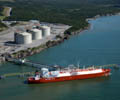

Norway’s pipeline gas exports to continental Europe and the UK jumped in July to the highest level since March given a period of relatively light planned maintenance shutdowns, an analysis of S&P Global Platts Analytics data showed Aug. 3.
Norwegian deliveries totaled 9.14 Bcm in July, up 9% year on year and by 22% month on month, and the highest volume since the 9.3 Bcm supplied in March.
NCS operators carried out relatively light planned maintenance work for the month following a heavy schedule in May and June, allowing exports to move higher to make the most of record high European gas prices.
Operators tend to schedule the main planned maintenance work in the lower-demand summer months, but look to minimize work during the planned annual shutdown of the Russian Nord Stream pipeline that took place this year on July 13-23.
There was, however, still unplanned work across the NCS in July, including a prolonged outage at the key Troll field.
The unplanned corrective maintenance works started at Troll on July 27 and have now been extended by two additional days until Aug. 5, according to gas grid operator Gassco.
The outage has reduced available capacity at Troll — Europe’s biggest gas field — by 27 million cu m/d.
Troll is operated by state-controlled Equinor, which said July 28 it was operating its flexible Norwegian gas fields at “full capacity” to make the most of high European gas prices.
Equinor varies production from Troll and Oseberg — for which it has government-approved production quotas — depending on the prevailing gas price in Europe.
“We have run our flexible gas fields at full capacity to capture additional value from the higher gas prices of the quarter, and we have also captured higher value from the deferrals we did last year,” its newly appointed CFO Ulrica Fearn said on a Q2 earnings call.
Last summer, Equinor deferred significant Norwegian gas volumes because of low prices, which it can do under the quota system.
European gas prices have risen strongly over the past year. According to S&P Global Platts price assessments, the average TTF day-ahead price in Q2 2021 was Eur24.80/MWh, up from Eur5.33/MWh over the same period of 2020.
Prices have moved even higher in Q3, with the TTF day-ahead price assessed at Eur42.10/MWh on Aug. 2.
Equinor’s gas production also received a boost in July from the startup of the much-delayed Martin Linge field.
According to S&P Global Platts Analytics, Martin Linge will produce 5.6 million cu m/d of gas at peak.
Country supplies
On a country-by-country basis, Norwegian exports to the UK in July rose sharply month on month to 1.91 Bcm, up from 1.37 Bcm in June, helped by the startup of Martin Linge, from which gas is piped directly into the UK at the St. Fergus receiving terminal.
Supplies of Norwegian gas to the Netherlands also jumped in July, with deliveries reaching 2.44 Bcm, up from 1.8 Bcm the previous month.
Dutch imports in July were the highest since August 2018.
Elsewhere in Europe, Norwegian gas deliveries to Germany edged up to 1.94 Bcm in July, from 1.88 Bcm in June.
Supplies to France rose to 1.56 Bcm — the highest volume since January — while deliveries to Belgium totaled 1.29 Bcm last month.
NCS production, meanwhile, also continues to be hampered by the long-term outage at the Hammerfest LNG export facility — Norway’s only LNG production plant — which was hit by a fire in September last year.
As a consequence of the shutdown of Hammerfest LNG, the Snohvit, Albatross and Askeladd fields have also been shut in.
The latest guidance from Equinor is for the plant to resume operations only in March 2022.
Source: Platts